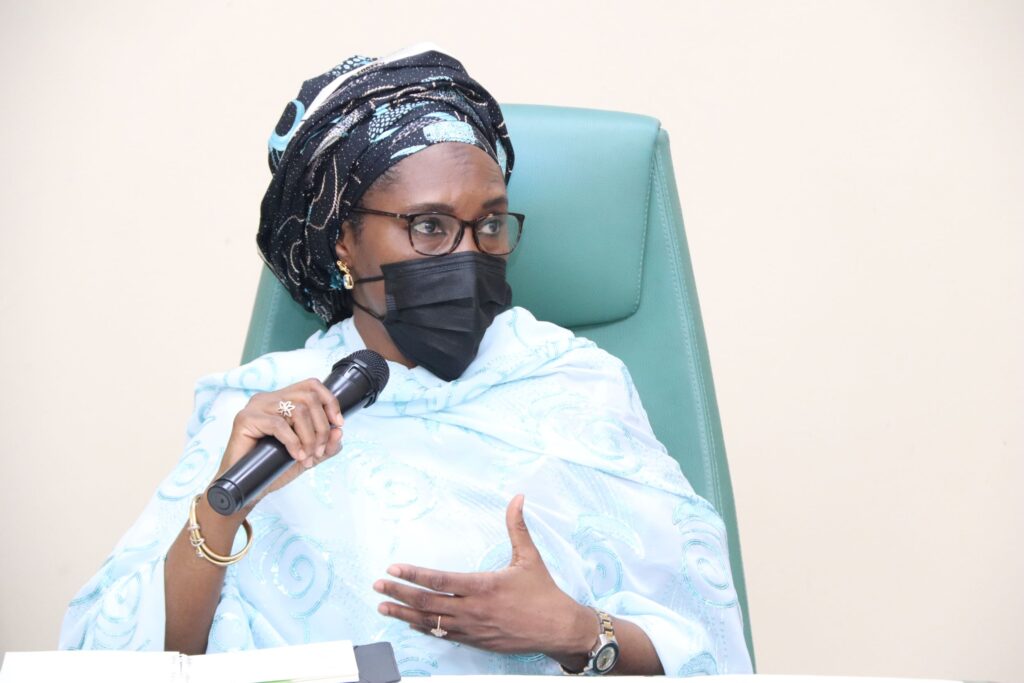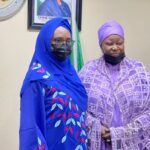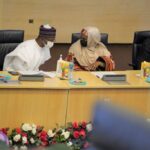The federal government of Nigeria has looked to derive feedback from national dialogue on COVID-19 economic impact and assessment of national and states recovery plan and policy options.
The Honourable Minister of Finance, Budget and National Planning, Mrs. Zainab Ahmed, made this known in her keynote address at the recently held national dialogue in Abuja meant to provide a critical feedback “as we continue implementation of our post-COVID recovery plans and develop the next generation medium and long-term national development plans.”
She noted that the government’s response to the crisis under the leadership of President Muhammadu Buhari has been proactive and people-oriented, with an emphasis on human capital development, critical infrastructure.
“The pandemic has required that we take a critical look at our health and economic policies, to swiftly introduce crisis management measures, catalyse support to the health sector, and accelerate certain key reforms while reimagining others entirely,” Mrs. Ahmed said.
“Several fiscal measures were put in place to balance health and economic issues in addressing the burden of COVID-19 on macro, small and medium enterprises (MSMEs), as part of the integrated policy framework which ensures coherence in fiscal, economy and health positions,” she also noted.
According to her, key government interventions have included: President Buhari’s swift establishment of a 12-member Presidential Task Force on COVID-19; establishment of a N500 billion COVID-19 Crisis Intervention Fund to finance the upgrade and improvement of healthcare facilities; creation of a special public works programme to employ 774,000 people; a robust healthcare and humanitarian response in terms of scaling up federal and sub-national interventions to address the acute health and livelihood impact of the COVID-19 Pandemic; the 2019 Finance Act which introduced various initiatives to boost agri-business with tax exemption for small businesses, among others.
The Honourable Minister further noted that Finance Acts 2019 and 2020 focused on key interventions such as promoting fiscal equity, aligning domestic tax laws with global best practices; introducing tax incentives for infrastructure and capital markets; significant tax relief for micro, small and medium-sized enterprises (MSMEs); and increasing revenue for the government.
She pointed to the amendments to the 2020 budget, 2020 – 2022 Medium Term Expenditure Framework and Fiscal Strategy Paper (MTEF/FSP), as well as the 2021 – 2023 MTEF/FSP, which involved accessing concessional borrowing windows to supplement the decline in oil and non-oil revenues; introduction of the N75 billion Nigeria Youth Investment Fund, with N25 billion earmarked in the 2021 budget.
Mrs. Ahmed also noted the following: Scale up of our social safety net programmes (including cash transfers, and school feeding programmes) to provide enhanced support to our vulnerable, and to women. “Government (through the National Social Safety Nets Coordinating Office (NASSCO)) has developed and formally launched earlier this month a rapid response register (RRR) to quickly scale-up the enrolment of poor and vulnerable citizens, mainly in urban areas; who will potentially benefit from cash transfers to cushion the socio-economic impact of the pandemic.
“In 2020, the following were amongst the measures put in place: The Securities and Exchange Commission (SEC), gave guidelines to regulated entities directing all public companies to continue to make material disclosures to investors on the impact of COVID-19 Pandemic on their business operations; Nigeria Stock Exchange (NSE) issues an extension of time for submission of the 2020 self-assessment form, quarterly returns, internal review report and branch report for the period ended 31 March 2020 as part of the palliatives to cushion the negative impact of the COVID-19 pandemic on dealing members.
In the keynote address, the Honourable Minister also stated: “National Insurance Commission (NAICOM) extended the deadline for insurance companies to carry out their recapitalisation, from 31st December 2020 to 30th September, 2021. Minimum paid-up capital for phase 1 is schedule for 31 December, 2020, while phase 2 is scheduled for 30 September, 2021. Nigeria Economic Sustainability Plan (NESP) seeks to secure legislative approval in respect of passage of Fiscal Stimulus Act and other provisions to back the ESP being developed as responses to challenges posed by COVID-19, which include support for MSMEs and creation of jobs.
Mrs. Ahmed also brought to note: “Short, medium and longer-term macroeconomic and development plan strategies arising from the multisector ESP, in advance of the successor plans to the Nigeria Vision 20:2020 (NV 20:2020) as well as the Economic Recovery and Growth Plan (ERGP).
She disclosed that government would continue to make critical investments in key sectors including agriculture, infrastructure, health, and education. To do so, “we must sustainably address the longstanding challenge of domestic revenue mobilisation, in part through continued implementation of the Strategic Revenue Generation Initiative (SRGI), and through continued incremental fiscal reforms via the introduction of annual Finance Bills, as well as reducing the cost of governance.
“We are also working collaboratively across Ministries, Departments and Agencies (MDAs), and with the State and Local governments to address financing for key cross-cutting issues. This includes working to significantly reduce poverty and harness our demographic dividend to achieve sustainable and inclusive growth, partly through job creation and by enabling the private sector and prioritising human capital development. In her words: “We will continue to improve the enabling environment for the private sector, to ensure the creation of jobs and support our diversification away from oil and gas. In particular, we are implementing programmes aimed at creating jobs for our youth, and to support MSMEs.
Furthermore, “we are scaling interventions aimed at improving the economic empowerment of women and girls – a key driver of economic growth, improved development outcomes, and improved economic resiliency. This includes enhanced access to financing and capacity building for women-owned businesses, particularly MSMEs. Additionally, we are focusing on enabling digital transformation and disruptive innovation, a key driver for MSME innovation and scale up across the country.





